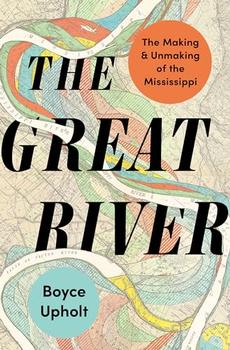Summary | Discuss | Reviews | More Information | More Books

The Making and Unmaking of the Mississippi
by Boyce Upholt
A sweeping history of the Mississippi River―and the centuries of human meddling that have transformed both it and America.
The Mississippi River lies at the heart of America, an undeniable life force that is intertwined with the nation's culture and history. Its watershed spans almost half the country, Mark Twain's travels on the river inspired our first national literature, and jazz and blues were born in its floodplains and carried upstream.
In this landmark work of natural history, Boyce Upholt tells the epic story of this wild and unruly river, and the centuries of efforts to control it. Over thousands of years, the Mississippi watershed was home to millions of Indigenous people who regarded "the great river" with awe and respect, adorning its banks with astonishing spiritual earthworks. The river was ever-changing, and Indigenous tribes embraced and even depended on its regular flooding. But the expanse of the watershed and the rich soils of its floodplain lured European settlers and American pioneers, who had a different vision: the river was a foe to conquer.
Centuries of human attempts to own, contain, and rework the Mississippi River, from Thomas Jefferson's expansionist land hunger through today's era of environmental concern, have now transformed its landscape. Upholt reveals how an ambitious and sometimes contentious program of engineering―government-built levees, jetties, dikes, and dams―has not only damaged once-vibrant ecosystems but may not work much longer. Carrying readers along the river's last remaining backchannels, he explores how scientists are now hoping to restore what has been lost.
Rich and powerful, The Great River delivers a startling account of what happens when we try to fight against nature instead of acknowledging and embracing its power―a lesson that is all too relevant in our rapidly changing world.
"A majestic history of the Mississippi River….[A]n exceptional natural history that never loses sight of the human players involved." ―Publishers Weekly (starred review)
"A lively survey of Old Man River, born of extensive research and travel….A fluent addition to the literature of America's rivers." ―Kirkus Reviews
"The Great River is easily one of the best books ever written about the Mississippi. It brings depth of scholarship to everything from geology to history to current politics, all of it elegantly written." ―John M. Barry, author of Rising Tide: The Great Mississippi Flood of 1927 and How It Changed America
"From mound-builders to levee-makers, Boyce Upholt gives us a Mississippi both wild and engineered, life-giving and furious―a river as full of contradictions as the country that has tried and failed to tame it. Impossible to stop reading, The Great River is a deeply felt meditation on the ways people have lived with nature's changes, and how we might live differently in the future." ―Bathsheba Demuth, author of Floating Coast: An Environmental History of the Bering Strait
"With masterful research and reporting, Boyce Upholt makes a compelling case that, despite our centuries-long efforts to control its unpredictable pulses with concrete, steel, and earthen berms, the Mississippi River in many ways remains wild as ever. And he shows us why that is good." ―Dan Egan, author of The Death and Life of the Great Lakes
This information about The Great River was first featured
in "The BookBrowse Review" - BookBrowse's membership magazine, and in our weekly "Publishing This Week" newsletter. Publication information is for the USA, and (unless stated otherwise) represents the first print edition. The reviews are necessarily limited to those that were available to us ahead of publication. If you are the publisher or author and feel that they do not properly reflect the range of media opinion now available, send us a message with the mainstream reviews that you would like to see added.
Any "Author Information" displayed below reflects the author's biography at the time this particular book was published.
Boyce Upholt is a journalist and essayist whose writing has appeared in the Atlantic, National Geographic, the Oxford American, and Virginia Quarterly Review, among other publications. He is the winner of a James Beard Award for investigative journalism, and he lives in New Orleans, Louisiana.
Your guide toexceptional books
BookBrowse seeks out and recommends the best in contemporary fiction and nonfiction—books that not only engage and entertain but also deepen our understanding of ourselves and the world around us.